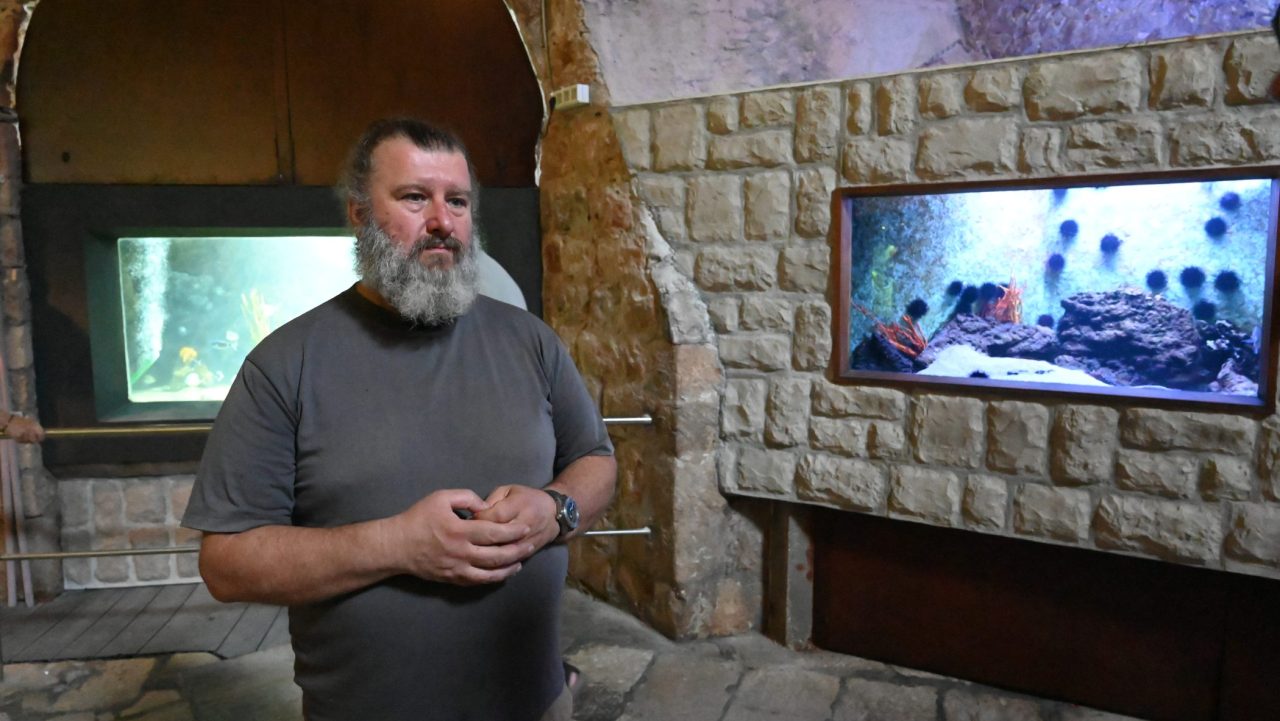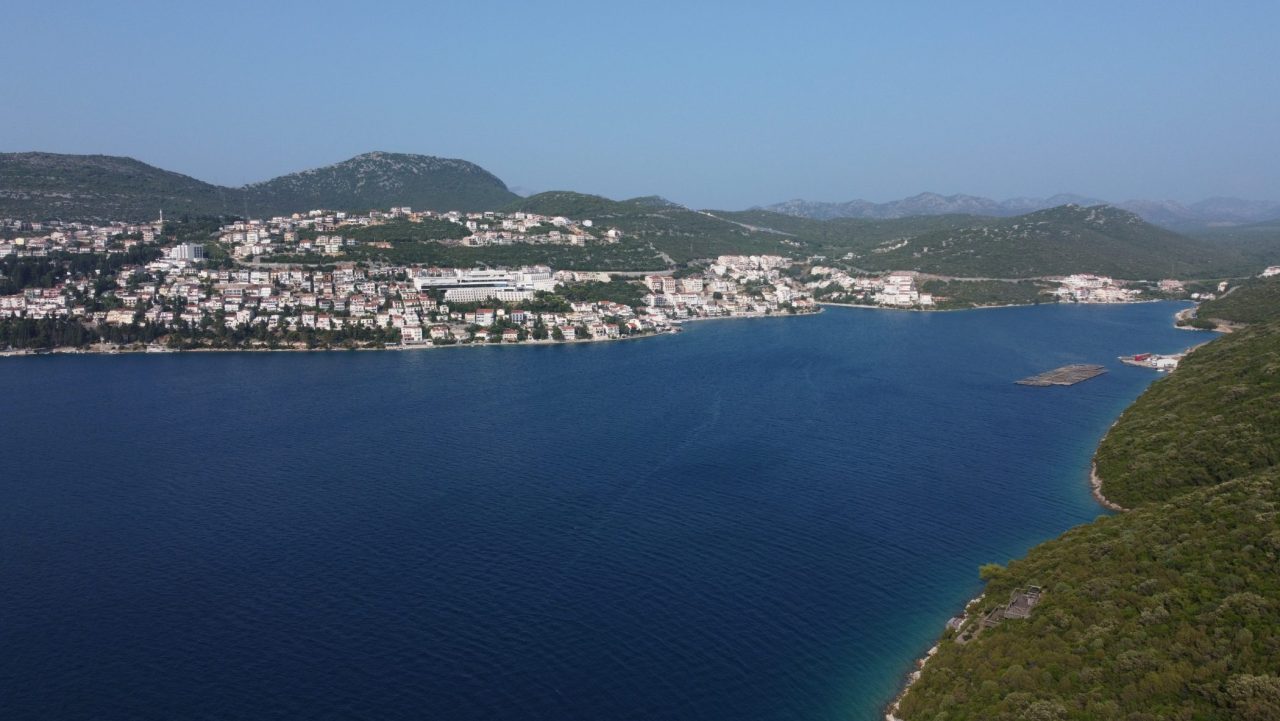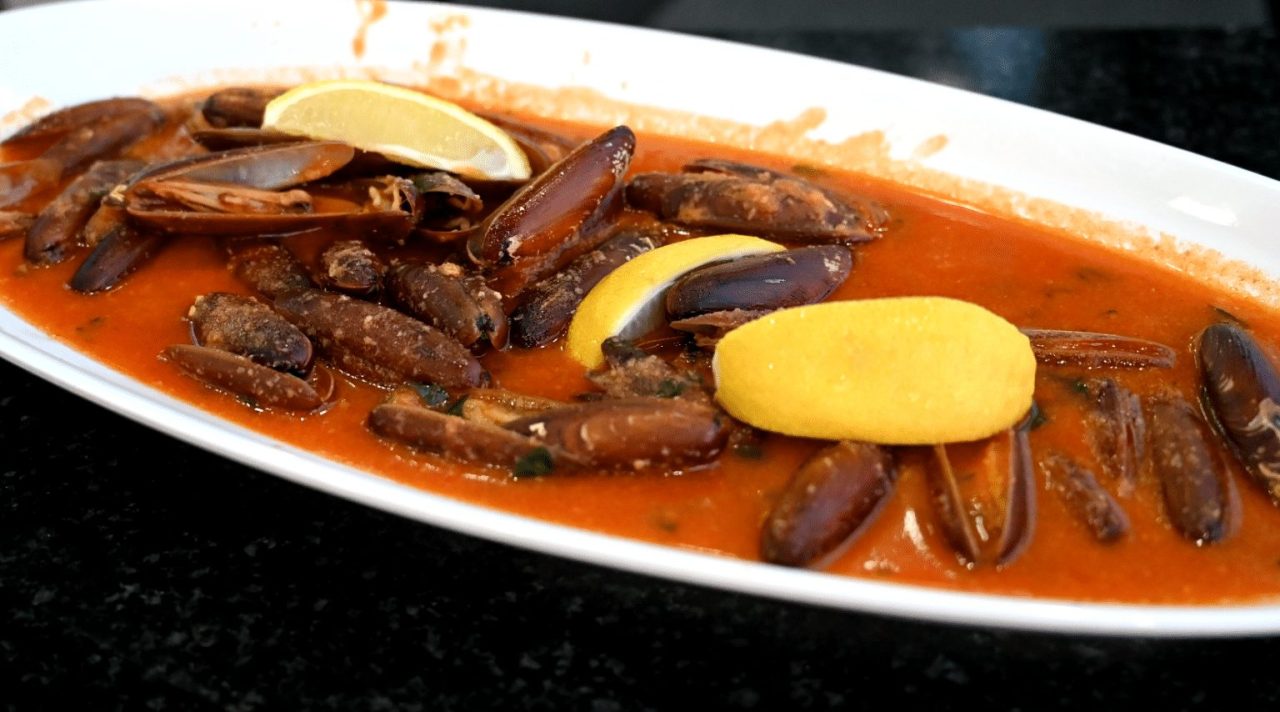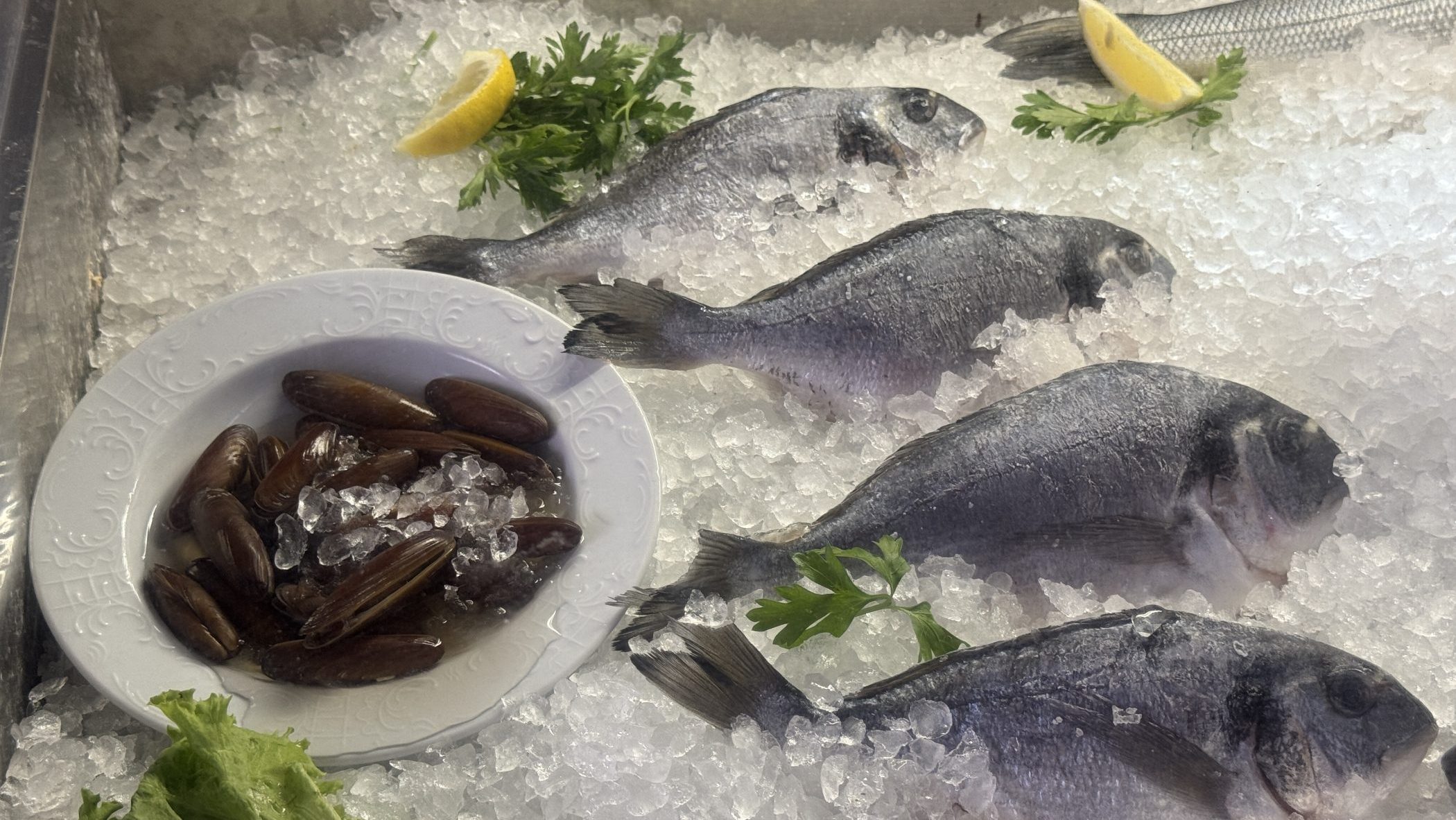This post is also available in: Bosnian
The diver surfaced with a handful of long, narrow, brown shells and handed them over the side of a small boat bobbing on the surface of the Adriatic Sea off Bosnia and Herzegovina’s sole coastal town, Neum.
It was mid-June and Neum was readying for its regular summer influx of some 300,000 visitors, swelling the town’s population almost a hundredfold over a period of just three months.
“I got these from a depth of about 11 metres,” the diver said. “Everything closer to the shore has already been hammered out.”
The date mussels lay motionless on the floor of the boat, a forbidden catch set to fetch the diver a handsome profit.
The harvesting of date mussels is prohibited in Bosnia and across the European Union, due to the damage caused by a process that involves smashing apart rocks on the seabed.
But while the diver would likely be arrested and fined in neighbouring Croatia or on the other side of the Adriatic in Italy, he freely goes about his work off the coast of Neum, safe in the knowledge that no one is watching.
Neum is likely the only place left in Europe where date mussels are openly displayed in restaurants and listed on menus, 11 years after a ban on their harvesting, possession and trade was imposed by authorities in Herzegovina-Neretva Canton, one of 10 cantons that make up Bosnia’s mainly Bosniak and Croat Federation entity.
The law envisages fines for individuals of between 150 and 510 euros, and up to 7,600 euros for businesses, but the diver knows he is unlikely to ever be caught.
In the space of a three-hour dive, he can harvest five or six kilograms of date mussels, which he sells to restaurants for between 125 and 150 euros. On a “good day”, he said, he can net up to 10 kilos.
“There are five or six of us who extract these shells in Neum, and each of us takes care of different restaurants in Neum and inland cities,” he said, speaking on condition of anonymity. During the summer, he said, he dives “every three to four days.”
“I think people love them just because they are banned everywhere,” he said.
The impact on the environment, however, is enormous.
“To get them out, to extract them from the stone, the stone must be broken, and you destroy the substrate in which they are found, which then destroys the whole ecosystem,” said Niksa Glavic, a marine scientist at the Institute for Marine and Coastal Research at the University of Dubrovnik.
“When you destroy the substrate for the sake of harvesting date mussels, you also destroy the habitat of other species, such as algae, diatoms, and some other vertebrates,” Glavic told BIRN. “On the other hand, you also disrupt the life cycles of other species that live in the rock, such as invertebrates, fish, and octopuses that hide within it.”
“In essence, you are demolishing the real estate, so to speak.”
Biodiversity damage

Niksa Glavi. Photo: BIRN/Ajdin Kamber
The date mussel, or Lithophaga, is a type of mollusk that slowly bores into coastal rocks and corals, creating tiny holes and cavities that create shelter for other organisms, such as small fish, crabs, octopus, worms, and algae.
Spending their whole lives in these holes, it can take date mussels 18 to 36 years to reach a length of 5-7 cm, which is the point at which they are considered edible.
Decades ago, 72-year-old Mirjana Raic used to swim across a small bay beneath the Klek Peninsula, which Neum overlooks, and harvest “a kilo or two” for her guests.
“Nowadays you can’t find them close to the shore,” she said.
Raic and her brother, Ivan Krmek, were born and raised on the Klek Peninsula. Krmek, 70, runs a fish and mussel farm in the bay. He said sea bream often attack the mussel farm because, nowadays, “they don’t have anything else to eat”.
“I haven’t seen an octopus in ages, as the majority of hiding places in the rock formations have been hammered by the date mussel hunters,” said Krmek.
Bosnia owes its access to the sea to a decision in 1699 by the then Republic of Ragusa, seated in Dubrovnik, to allow the Ottomans to extend their reach to a 22-kilometre strip of Adriatic coastline and thus create a land buffer against the encroaching Venetians.
The arrangement remained after the demise of the Ottoman empire, through the first and second incarnations of Yugoslavia and into the 1990s when Bosnia became an independent state.
Today, Neum is bordered to the north and south by the EU, where prohibitions on the harvesting of date mussels are strictly enforced.
Not so in Bosnia, which, three decades since the end of the 1992-95 war, is still a long way off EU accession.
“I get a call from a restaurant usually a day or two in advance and they tell me how much they need depending on demand,” said the diver.

Neum. Photo: BIRN/Ajdin Kamber
He and his fellow hunters are paid directly by restaurants in Neum, and via intermediaries when it comes to restaurants inland. The divers get 50 Bosnian marks per kilo, or 25 euros. In a restaurant, a kilo of date mussels can fetch 120 marks, or 60 euros, making them a relatively expensive delicacy.
This reporter saw them displayed on ice in a Neum restaurant and listed on the ‘daily offer’ board. A serving of 300 grams cost 40 marks, or 20 euros, and the words ‘date mussels’ were plain to see on the bill, based on which the restaurant pays its taxes.
“Usually, politicians and people who have money order them; a lot of people come from Croatia to eat them, as they’re banned there,” said a waiter, seemingly unaware that they are banned in Neum too.
Out of 26 Neum restaurants listed on TripAdvisor, BIRN identified at least nine as serving date mussels based on guest reviews.
Nikola Prkacin, director of the Neum tourist organisation, blamed a “lack of inspections”.
“I want to emphasise that the extraction and consumption of date mussels is banned in Neum, as this practice has lasting consequences for the environment,” he said.
“I appeal to guests not to ask for these shells, as the damage done by their extraction can’t be fixed for 30 to 50 years.”
Neither the cantonal nor the municipal inspectorate responded to requests for comment. Some close to the issue say inspectors are more focussed on unregistered workers and black market accommodation, given the greater potential benefit to the budget if stamped out.
‘Once they’re banned…’

A 20-euro portion of date shells. Photo: BIRN/Ajdin Kamber.
The prohibition in Bosnia applies only to the Herzegovina-Neretva Canton of which Neum is a part, not to the other nine cantons in the Federation or in Bosnia’s other entity, the predominantly Serb-populated Republika Srpska.
Date mussels are not even listed as ‘protected’ or ‘strictly protected’ species at the Federation level.
In Bosnia, date mussels, of course, can only be harvested in Neum, but without laws prohibiting their trade elsewhere, restaurants across the country also freely display them on their menus. Effectively, responsibility for stamping out the trade falls solely on the shoulders of the Municipality of Neum.
“This is in essence Neum’s law, and their inspectorate is in charge of controls,” the Ministry of Agriculture, Forestry and Water Management in Herzegovina-Neretva Canton told BIRN.
The municipality did not respond to a request for comment.
Meanwhile, in Sarajevo, one restaurateur said date mussels are particularly popular among his more affluent clientele.
“Once they’re banned, I’ll remove them from the menu,” he said, speaking on condition of anonymity.
In Croatia, the prohibition applies nationwide, meaning anyone caught trading date mussels anywhere in Croatia can be fined.
Croatia’s Nature Protection Inspectorate told BIRN it conducts roughly 50 inspections of fish markets and restaurants across the country every year to eradicate the sale of date mussels and other ‘strictly protected’ species.
Such delicacies are not sold openly, but ‘under the counter’ at markets or by special order for ‘select guests’ in restaurants.
Since 2020, the Inspectorate said it had received eight reports of date mussels being served in restaurants in the capital, Zagreb, and the coastal region of Dalmatia. One restaurant owner in Zagreb was fined just over 1,000 euros, another just over 1,100 euros.
Smugglers will be punished, a Croatian border police officer told BIRN, whether caught with “a kilo of date mussels or a kilo of cocaine”.
In the absence of an entity-level or state-wide prohibition, Sarajevo lawyer and former prosecutor Jasmina Iftic said the Federation could, theoretically, apply legislation forbidding the destruction and pollution of the environment.
“If this involves harvesting over a wider area and if it would or could lead to a deterioration of biodiversity conditions and thereby endanger the quality of marine subsoil, then it could amount to a specific criminal offence of environmental pollution,” Iftic told BIRN.
Vuk Tesija contributed to reporting to this story from Osijek.
This article was produced with support from Internews’ Earth Journalism Network.
